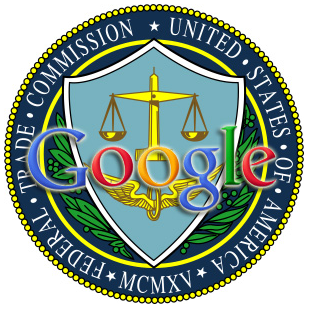FTC Playing Antitrust Poker With Google And Looking For A Way To Save Face
Last week there was a report that “four out of five FTC commissioners” favored going forward with an antitrust case against Google. The Reuters article in which the claim appeared mentions but doesn’t emphasize the litany of “vertical search” complaints against Google raised by competitors. Those “Google favors its own results” claims have been at […]
 Last week there was a report that “four out of five FTC commissioners” favored going forward with an antitrust case against Google. The Reuters article in which the claim appeared mentions but doesn’t emphasize the litany of “vertical search” complaints against Google raised by competitors.
Last week there was a report that “four out of five FTC commissioners” favored going forward with an antitrust case against Google. The Reuters article in which the claim appeared mentions but doesn’t emphasize the litany of “vertical search” complaints against Google raised by competitors.
Those “Google favors its own results” claims have been at the center of the European antitrust inquiry and, perhaps until now, at the heart of any potential US case against Google. Yet the article seems to suggest that the FTC is looking elsewhere for Google liability — or vulnerability.
Reuters writes, “the FTC commissioners have given weight to other complaints that Google refuses to share data that would allow advertisers and developers to create software to compare the value they get on Google to advertising spending on Microsoft’s Bing or Yahoo.” There’s also mention of “Google’s handling of valuable patents” or standards-essential patents, which the company acquired when it bought Motorola, and the question of whether it is licensing them on fair and reasonable (“FRAND”) terms.
The problem with grounding an antitrust case in the “Google favors its own results” argument is that it’s both legally and practically challenging to pursue:
- It cuts to the heart of Google’s ability to innovate with its own product and faces “political” objections
- It’s a difficult argument for the FTC to make legally and win on the merits
- Any potential remedy (other than “labeling“) involving intervention in the SERP is highly problematic for the FTC
The FTC is thus probably looking at other areas to press in any case against Google — hence the discussion of “other complaints” such as standards-essential patents and AdWords data-sharing. The patent-licensing issue is easily resolved. And while the AdWords data sharing question is a bit more complex it’s also another issue that can be resolved relatively straightforwardly.
Resolving the FRAND patent and AdWords data sharing issues would, however, fail to satisfy Google’s rivals and especially anti-Google lobbying organization FairSearch.org whose raison d’être is the vertical search issue. Yet it appears that the FTC is being very careful here, trying to apply public pressure on Google while looking for “openings” where it can gain concessions or “wins” without actually embarking on costly and potentially unsuccessful litigation.
It would appear that there’s very much a realpolitik calculation going on at the FTC, as much as any principled legal evaluation of the case against Google. Indeed, the FTC is playing a kind of public poker with Google. It’s quite possible that the FTC itself leaked the claim that “four out of five” FTC commissioners favor an antitrust case to put more negotiating pressure on Google. The hiring of celebrated litigator Beth Wilkinson earlier this year may have been part of that larger poker game as well.
In his recent remarks at the Google Zeitgeist conference, CEO Larry Page said, “We’ve had a pretty good debate with the regulators [about antitrust issues].” He added that Google has “taken the approach to work with them; I think that’s been working. I’m hopeful that will continue to work well.”
Page decried the idea that regulators potentially want to “lock things down” with rules that could prevent future product development and innovation. He cited Google Now as a product that wouldn’t have been possible prior to the introduction of Google’s new unified privacy policy and the combining of user data across properties (PC and Android).
In contrast to the picture presented of an agency being gung-ho about antitrust litigation the FTC is probably looking instead for a way to “save face.” After an involved and very high-profile investigation it politically can’t walk away and say “nothing to see here.” However it would also be taking a big chance in litigating a case that it has a better than 50 percent chance of losing.
Most of the saber-rattling, such as the “four out of five” claim in the Reuters article, is probably about negotiating leverage. The FTC would much rather settle with Google and be able to claim a win — even if that’s in more peripheral areas of the case — than go to court, expend considerable resources and potentially be embarrassed by a defeat.
In the video below of the Page Zeitgeist interview, he starts speaking about antitrust issues at 9:10 in response to a question from Wall Street Journal reporter Amir Efrati.
Contributing authors are invited to create content for Search Engine Land and are chosen for their expertise and contribution to the search community. Our contributors work under the oversight of the editorial staff and contributions are checked for quality and relevance to our readers. The opinions they express are their own.
Related stories